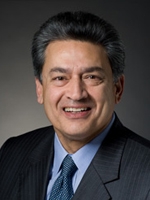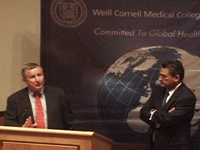Rajat Gupta never saw himself helping the poorest people in the world battle diseases largely forgotten in the developed world. As the former worldwide managing director of the consulting firm McKinsey and Co., Gutpa spent his time solving business problems for the world's most successful companies.
"I have a completely accidental involvement in global health," he says. "This was not the design of my career."

Rajat Gupta
Asked personally by U.N. Secretary General Kofi Annan in 2002 to chair of the Global Fund to Fight AIDS, Tuberculosis and Malaria, Gupta, who is also a member of the Weill Cornell Medical College Board of Overseers, is now involved at the ground level in the battle to reduce the global disease burden.
On March 20, Gupta spoke in Uris Auditorium about the Global Fund's mission, as well as how strategies borrowed from the business world are helping to fund the worldwide health fight in a down economy.
"This is an era punctuated by billion-dollar bailouts and pyramid schemes gone horribly wrong. The global health community is not immune," said Sandeep Kishore, a fourth-year MD-PhD student at Weill Cornell who leads the student organization Universities Allied for Essential Medicines at Weill Cornell, which sponsored the event. "Every dollar that is spent is being heavily scrutinized and nobody knows this better than Mr. Gupta," he said.
"The global health community is very much at an inflection point right now," Gutpa said. "There have been dramatic successes, but the majority of countries are not meeting [U.N.] goals to improve child survival and maternal health."

Dr. Antonio M. Gotto Jr. and Rajat Gupta speaking in Uris Auditorium, March 20.
The Global Fund's innovation is that it is strictly a financing vehicle, Gupta said. It does not develop new global health programs, nor does it implement them; instead, the Global Fund operates much as an investment group does: it accepts proposals from local organizations, decides whether to finance them, and regularly reviews the performance of funded programs.
Just seven years after its launch, the Global Fund is now the main source of finance for programs to fight AIDS, tuberculosis and malaria in the world, providing more than $11.4 billion to programs in 136 countries.
Accountability and economy — two principles borrowed from business — are central to this approach, Gupta said.
"Performance-based funding is at the heart of our operating model," Gupta said. The organization requires recipients to hit specific targets throughout the grant, Gupta said, and in cases where expectations have not been met, the organization has pulled funding.

Fourth-year MD-PhD student Sandeep Kishore
"We need to operate in a very different mode, going after all the efficiencies that we can and being extremely conscious of every dollar spent," Gupta said.
Academic institutions like Weill Cornell can contribute by providing a "neutral voice" in the global health debate, he said.
Dean Antonio M. Gotto, who welcomed Gupta at the start of the discussion, also spoke at length of Weill Cornell's international initiatives. In addition to collaborative programs in Haiti, Tanzania and elsewhere, fully half the student body participates in international programs. "We are truly committed to global health," Dr. Gotto said.

